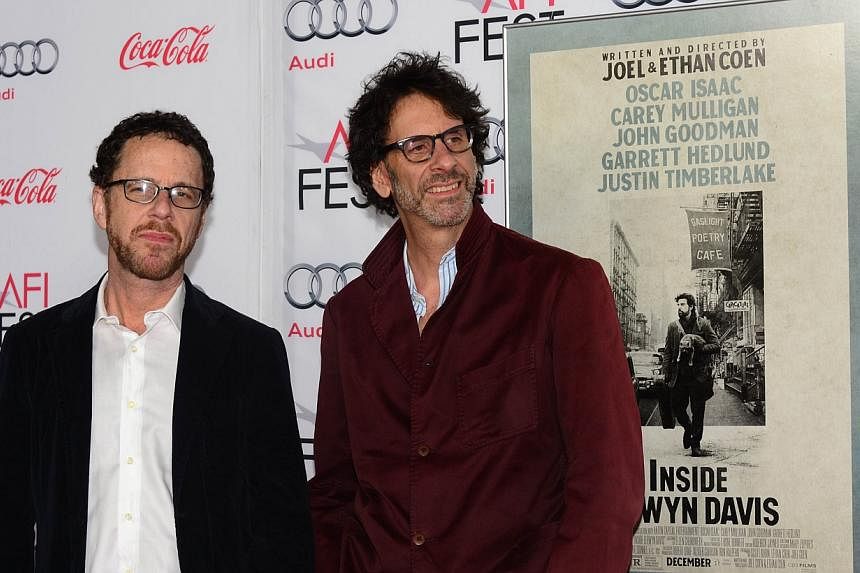Los Angeles (AFP) - Regarded as two of the most innovative directors in the world, brothers Joel and Ethan Coen have been pushing back the boundaries of movie-making for nearly three decades.
The nearly inseparable American duo, who will chair the Cannes film festival jury in May, write, direct and produce their films jointly. They have also edited movies, under the alias Roderick Jaynes.
They know Cannes well, having won the Palme d'Or in 1991 for Barton Fink, and the best director prize for Fargo in 1996 and The Man Who Wasn't There in 2001. Their Inside Llewyn Davis won them the jury's grand prize in 2013.
Since exploding onto the scene in 1984 with their offbeat thriller Blood Simple, the two have reeled off a dozen films, each notable for their distinctive quirky humour or macabre themes.
Favoured by critics and film festivals, they have won more than 100 prizes together. They have been jointly nominated for 12 Academy Awards and one individual Oscar each.
The siblings are known as the "two-headed director" within the movie world for their seamless ability to work alongside each other.
Joel, 60, and Ethan, 57, grew up in St Louis Park, Minnesota as the children of college professors. They had an interest in film from an early age, remaking movies seen on television with a Super-8 camera they bought using money saved from mowing lawns.
After graduating from Simon's Rock College of Bard in Massachusetts, Joel spent four years studying film at New York University, while Ethan attended Princeton, where he graduated in philosophy in 1979.
Joel's early experience involved working as an assistant editor on Sam Raimi's 1981 film The Evil Dead and it was another three years before the two brothers arrived with Blood Simple, which they wrote and directed.
The film is notable for the appearance of Frances McDormand, who would later marry Joel before appearing in several of the brothers' films.
The Coens followed up with their screwball 1987 comedy Raising Arizona starring Nicolas Cage and Holly Hunter as a married couple who steal a baby to raise as their own.
The start of the next decade saw the Coens pay homage to gangster films with the 1990 flick Miller's Crossing, featuring a youthful Gabriel Byrne, Albert Finney and John Turturro.
Two memorable comedies - Barton Fink (1991) and The Hudsucker Proxy (1994) - came next, before arguably the Coens' best-known film, Fargo, in 1996.
The movie, about a bungling car salesman (William Macy) who sets up a bogus kidnap plot involving his wife with disastrous consequences, earned two Oscars: best actress for McDormand and original screenplay for the Coens.
It has since been made into a television series that began in 2014, with the Coen brothers serving as executive producers.
A dramatic change of tone was to follow with 1998's The Big Lebowski, a surreal comedy about an aging Californian slacker (Jeff Bridges) who is mistaken for a millionaire, and hilarity ensues.
Another comedy, O Brother, Where Art Thou? starring George Clooney, John Turturro and Tim Blake Nelson as three convicts on the run in 1930s Mississippi came in 2000. The film, a loose interpretation of Homer's The Odyssey, was nominated for two Oscars.
The Coens returned to neo-noir in their next film, The Man Who Wasn't There (2001), while a second collaboration with Clooney came in the 2003 offbeat comedy Intolerable Cruelty. A remake of the classic comedy The Ladykillers, starring Tom Hanks, came in 2004 before the bleak No Country For Old Men, which won four Oscars in 2008 - best director, best picture, best adapted screenplay and best supporting actor for Javier Bardem.
Later that year, they teamed up with Clooney and McDormand again in Burn After Reading, a comedy about a hapless pair of gym employees trying to make money from a disc containing the memoirs of a CIA agent.
In 2009 came A Serious Man, a typically black comedy about a Midwest professor who watches his life unravel through a series of incidents, seemingly unable to stop the downward spiral.
True Grit, (2010) a remake of the classic John Wayne western, took the Coens into unexplored territory.
The mostly urban, New York-based pair had never worked with animals, for example, let alone horses thundering across plains in bloody shootouts.
But some of their trademark touches are there to see - unexpected graphic violence, odd verbal mannerisms - if not as obvious as in many of their award-winning films.
They followed up with Inside Llewyn Davis, a nostalgic film full of humor that follows a young singer's forays into the Greenwich Village folk music art scene of the 1960s.

